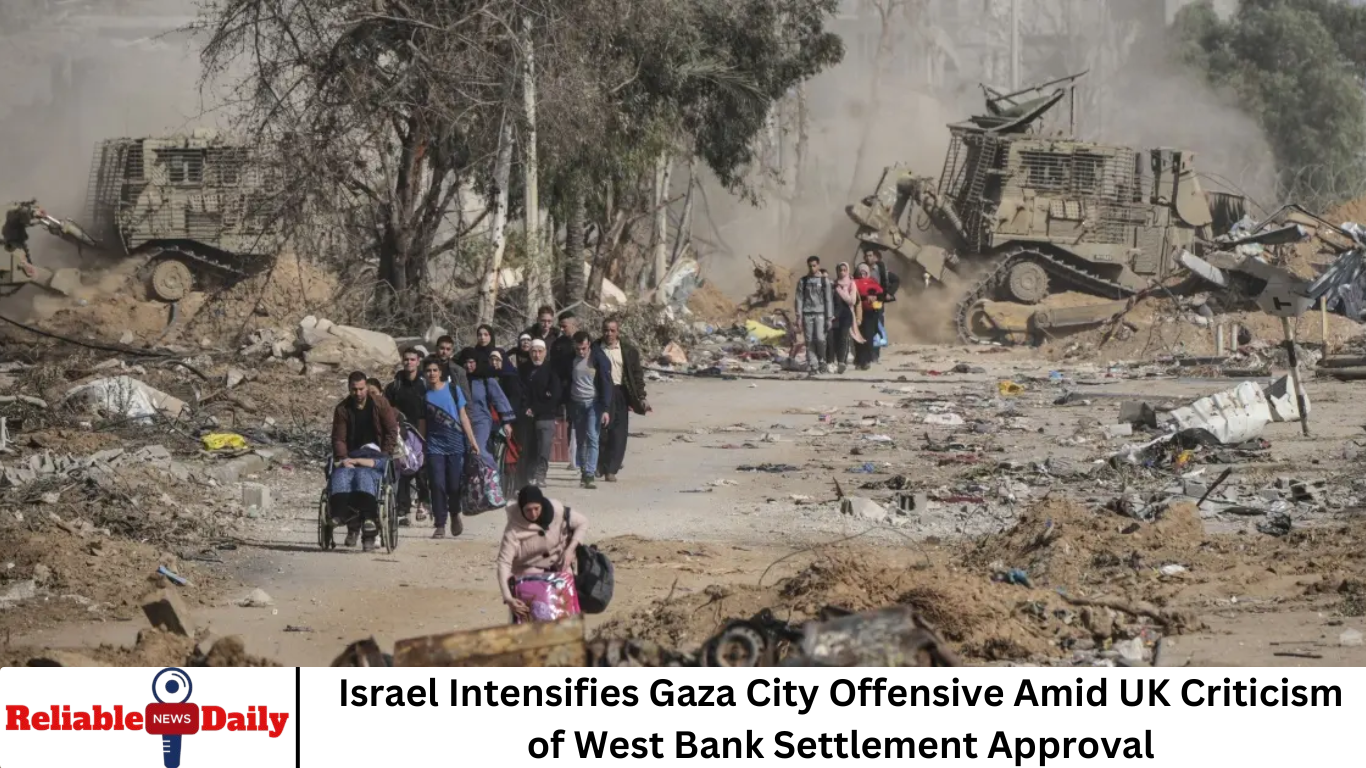Israel has announced a significant escalation of its military operations in Gaza City, drawing global attention and criticism. Simultaneously, the United Kingdom has condemned Israel’s approval of a large
new settlement in the West Bank, calling it a “flagrant breach of international law.” These events have intensified international scrutiny on Israel’s policies in Palestinian territories, highlighting ongoing tensions in the Middle East.
The Israel Defense Forces (IDF) confirmed that the military had entered the second phase of Operation Gideon’s Chariots, which began in May. IDF spokesperson Effie Defrin described Gaza City as a “stronghold of regime and military terror,” emphasizing Israel’s focus on targeting Hamas operations. Meanwhile, UK Foreign Secretary David Lammy publicly criticized the settlement approval, highlighting the diplomatic friction between Israel and European allies.
More Read: US Border Phone Searches Reach Unprecedented Levels
The Escalation in Gaza City
Operation Gideon’s Chariots: Phase Two
The IDF’s announcement marks a major escalation in Gaza, with reports indicating intensified airstrikes, targeted raids, and increased military presence in key neighborhoods. Operation Gideon’s Chariots aims to disrupt Hamas’ operational capabilities and weaken its influence in Gaza City.
Effie Defrin, IDF spokesperson, stated that Gaza City serves as a strategic center for Hamas, describing it as a hub of military activity and regime support. Israel has cited repeated rocket attacks on its territory and the ongoing threat posed by Hamas as justification for the operation.
Humanitarian Impact
The escalation has sparked concerns from international organizations about the humanitarian impact on Gaza’s civilian population. The densely populated city has already suffered infrastructure damage, including residential areas, medical facilities, and schools. Aid agencies warn of increasing civilian casualties, shortages of essential supplies, and potential displacement of thousands of residents.
Regional Implications
The intensified offensive in Gaza has regional ramifications, including heightened tensions with neighboring countries and potential destabilization in the already fragile Middle East political landscape. Analysts suggest that the escalation could influence the ongoing Israel-Palestine conflict and affect international diplomatic efforts to broker peace.
UK Criticism of West Bank Settlement Approval
David Lammy’s Statement
UK Foreign Secretary David Lammy strongly condemned Israel’s decision to approve a new settlement in the West Bank, calling it a “flagrant breach of international law.” Lammy emphasized that such settlements undermine the prospects for a two-state solution and exacerbate tensions between Israelis and Palestinians.
The settlement approval comes amid ongoing international debates about Israel’s settlement policies. The UK, along with other European nations, continues to advocate for halting settlement expansion as part of a broader effort to achieve lasting peace in the region.
International Law Perspective
West Bank settlements are widely regarded as illegal under international law, including the Fourth Geneva Convention, which prohibits an occupying power from transferring its civilian population into occupied territory. Israel disputes this interpretation, arguing that settlement construction is legal and necessary for security and development.
The UK’s condemnation reflects longstanding international concern about Israel’s settlement policy and its impact on the feasibility of a negotiated peace settlement with Palestinians.
Historical Context of Gaza City Operations and Settlements
Gaza City and Hamas
Gaza City, the largest urban center in the Gaza Strip, has been a focal point of conflict between Israel and Hamas for decades. The area serves as both a civilian population center and a strategic stronghold for Hamas operations. Israel maintains that Hamas uses Gaza City as a base for military planning, weapons storage, and launching attacks on Israeli territory.
Hamas, designated as a terrorist organization by Israel, the United States, and the European Union, continues to operate in Gaza despite repeated Israeli military campaigns. The ongoing presence of Hamas in densely populated areas complicates Israel’s military operations and heightens the risk of civilian casualties.
West Bank Settlements
Israeli settlements in the West Bank have been a contentious issue since the 1967 Six-Day War, when Israel occupied the territory. Settlements are communities established by Israel on land claimed by Palestinians for a future independent state.
The international community largely considers these settlements illegal, though Israel argues their legality based on historical, religious, and security claims. Settlement expansion has consistently drawn criticism from the UN, EU, and countries like the UK, as it is seen as a major obstacle to peace negotiations.
Global Response
European Union and United Nations
The European Union and United Nations have expressed concern over both the Gaza offensive and settlement expansion. The EU called for restraint in Gaza and reiterated opposition to settlement construction, while the UN warned of worsening humanitarian conditions in Gaza City.
United States Position
The United States has historically maintained close ties with Israel, often defending its right to self-defense while also advocating for a negotiated peace with the Palestinians. Washington has expressed concern about civilian casualties in Gaza but has not issued a formal condemnation of the settlement approval at the same level as the UK.
Middle East Reactions
Neighboring countries, including Jordan, Egypt, and Lebanon, have also voiced concerns about escalating tensions. Regional analysts suggest that the military operations in Gaza and settlement expansion in the West Bank could inflame broader regional instability if not carefully managed.
Implications for Peace Efforts
Threat to Two-State Solution
The escalation in Gaza and settlement expansion in the West Bank complicate efforts toward a two-state solution, widely considered the most viable framework for resolving the Israel-Palestine conflict. Settlements are viewed as a direct obstacle to creating a contiguous, viable Palestinian state, while military operations in Gaza exacerbate humanitarian crises and deepen mistrust between parties.
Diplomatic Challenges
Israel’s actions have heightened diplomatic tensions with European nations, particularly the UK. This strain may affect future cooperation on regional security, humanitarian aid, and peace negotiations. Experts warn that without concerted international pressure and dialogue, the cycle of violence and settlement expansion may continue indefinitely.
Frequently Asked Question
Why is Israel intensifying its Gaza City offensive?
Israel has escalated military operations in Gaza City as part of Operation Gideon’s Chariots, aiming to target Hamas strongholds and disrupt militant activity. The IDF cites ongoing security threats, including rocket attacks, as the primary reason for the offensive.
What is the UK’s response to Israel’s West Bank settlement approval?
UK Foreign Secretary David Lammy condemned the settlement approval, calling it a “flagrant breach of international law.” The UK views settlement expansion as an obstacle to the two-state solution and a threat to peace in the region.
What is the significance of Gaza City in the Israel-Palestine conflict?
Gaza City is a densely populated urban center and a strategic base for Hamas. It serves as both a civilian population hub and a military stronghold, making it central to Israel’s operations against Hamas.
Are West Bank settlements considered legal under international law?
Most of the international community, including the UN and EU, considers West Bank settlements illegal under the Fourth Geneva Convention. Israel disputes this, citing historical, security, and legal claims for settlement construction.
What are the humanitarian impacts of the Gaza offensive?
The escalation in Gaza has led to civilian casualties, damage to infrastructure, shortages of essential supplies, and the displacement of thousands of residents. Humanitarian organizations have expressed serious concern over worsening conditions.
How has the international community reacted to these developments?
The UK, EU, and UN have condemned settlement expansion and called for restraint in Gaza. Neighboring countries and global powers have expressed concern about regional stability, while the US continues to support Israel’s right to self-defense but urges protection of civilians.
How do these events affect peace efforts between Israel and Palestine?
Military escalation in Gaza and settlement expansion in the West Bank hinder the two-state solution, increasing tensions and complicating diplomatic efforts. These actions deepen mistrust and make negotiations for lasting peace more challenging.
Conclusion
Israel’s intensification of its Gaza City offensive, combined with UK condemnation of West Bank settlement approval, underscores the complex dynamics of the ongoing Israel-Palestine conflict. Operation Gideon’s Chariots represents a major military escalation, while settlement expansion continues to provoke international criticism. The situation highlights the urgent need for diplomatic engagement, humanitarian aid, and a renewed commitment to peace. The global community faces a delicate challenge: balancing Israel’s security concerns with the rights and aspirations of Palestinians, all while preventing further escalation in an already volatile region.
.

